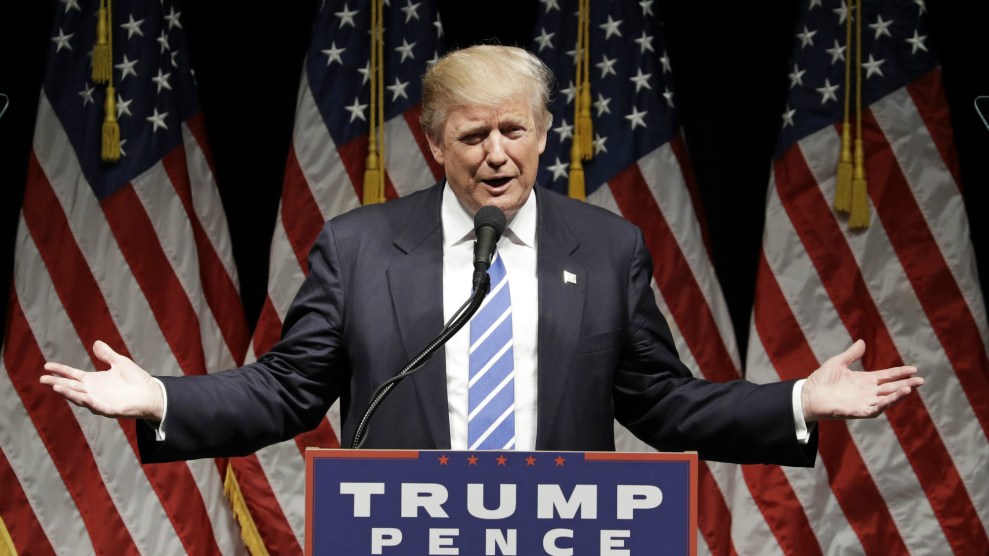
Joe Raedle/AP
A campaign finance watchdog has bad news: Everyone is breaking the rules in this election. The nonpartisan Campaign Legal Center announced Thursday that it had filed two sets of complaints with the Federal Election Commission, charging that the campaigns of both Donald Trump and Hillary Clinton are improperly coordinating with super-PACs that support them.
Under the 2010 Citizens United Supreme Court decision, super-PACs are given wide latitude when it comes to fundraising and spending money. But there are a handful of rules to ensure that the super-PACs, which can raise funds without limit, don’t coordinate with the actual candidates. The theory is that there’s nothing wrong with unlimited money, as long as the candidates aren’t involved. That’s not working, Campaign Legal Center general counsel Larry Noble says, because nobody is bothering to enforce the rules.
“We have been forced to file these complaints because a dysfunctional [Federal Election Commission] has been sitting idly by as the campaigns of the presidential candidate of both major parties are involved in unprecedented coordination with super PACs in violation of the law,” Noble said in a statement. “These are not minor or technical violations.”
A Republican super-PAC operative who has done work to support Trump—though not with any of the super-PACs listed in the Campaign Legal Center’s complaints—said the accusations were on the mark.
“In my opinion: no question,” he told Mother Jones when asked whether coordination is occurring. “And the FEC is really dysfunctional.”
He added that making the correct accusation is one thing, but proving it is an entirely different matter.
It is true that the FEC is barely functioning. It frequently deadlocks, and last year Ann Ravel, the then-FEC chairwoman, and another Democratic commissioner filed a complaint against their own agency, accusing it of failing to enforce laws. Ravel later told the New York Times that this election, “the likelihood of the laws being enforced is slim.” And any action, or even inaction, on these complaints is likely to take some time: It was only this spring, five years after the complaint, that FEC commissioners deadlocked over whether to investigate complaints about pro-Mitt Romney super-PACs in 2011.
On both sides, the groups being accused by the Campaign Legal Center don’t necessarily deny the close relationship with the campaigns; they simply use justifications that the watchdog group says are improper and could lead to new loopholes in campaign finance regulation.
The accusations on the Trump side are leveled at two super-PACs that are believed to have the campaign’s blessing: Rebuild America Now, founded by longtime Trump associate Tom Barrack, and Make America Number 1, a pro-Ted Cruz super-PAC that was repurposed after its primary backers, hedge fund billionaire Robert Mercer and his daughter Rebekah Mercer, decided to back Trump.
In the case of Rebuild America Now, the Campaign Legal Center is arguing that close Trump aides left the campaign and joined the super-PAC while continuing to work closely with their old colleagues at Trump headquarters. The revolving door went the other way with Make America Number 1, the group says in its complaint, with the super-PAC’s former president, Kellyanne Conway, now working as Trump’s campaign manager. Further, Make America Number 1 used a data analytics firm owned by Mercer that the campaign is now using. The group also notes that the right-wing news site Breitbart.com, which was run by Stephen K. Bannon before he became Trump’s campaign chairman, is at least partially owned by the Mercers.
On the Democratic side, the Campaign Legal Center’s complaint takes aim at Correct the Record, a super-PAC led by Democratic operative David Brock, which focuses on opposition research and which has worked closely with the Clinton campaign. Correct the Record has argued that as long as it doesn’t produce paid content, it is not in violation of campaign finance laws. The Campaign Legal Center says that arrangement is intended to apply to volunteer efforts, not highly sophisticated, multimillion-dollar operations that post research online for free.













